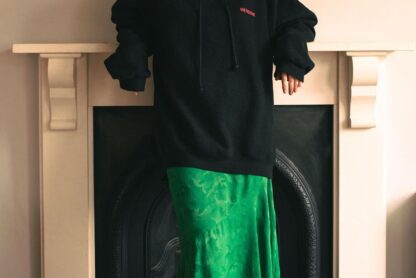A Londoner, Ben left the British fashion capital to come and work in Munich. A bold move I would say as most people would do the opposite. Leaving the comfort zone of his hometown, he started off as a fashion product editor at MYT to then climb up the career ladder at an impressive pace. After a little bit more than one year he became Content Manager. Ah, did I mention when he got the position he was not yet in his mid-twenties?
Ben is with Kim and Sara another friend and colleague I met at www.mytheresa.com. Today he is Content Director for Maison Héroïne. His story is really interesting because he perfectly embodies the hard working Londoner. With a degree in languages, he made everything possible to get his foot into fashion – an industry in which he had no background in. Wherever he goes people remember his radiant energy (laugh larger than life) AND professionalism hence why they remember, recommend and give him opportunities. I hope this interview will give you a glimpse of what it means to intern in a city like London, how having a degree in languages can get you a job in fashion and lastly understand the multifaceted aspect of content.
What did you study?
I studied French, German and Italian. Apart from two essays on Italian design/fashion, nothing to do with what I’ve ended up doing really.
What made you want to work in fashion?
I had always loved fashion and I think when I started studying at university level, I didn’t have the creative outlet I’d had during my school years, so I kind of upped the ante as far as my interest in fashion was concerned. Quite organically. And it became very clear very quickly that if I could make it so that my biggest interest was the foundation of my career, I’d be pretty happy with my career. From early on it felt like a no-brainer.
What was your first job in the industry?
Well, while I was still at university, I interned during my summers, Christmas breaks, reading weeks, blah blah blah. I first interned at Marios Schwab, who was one of the more important London designers back then. My first “proper” job after university was at Asos. I freelanced as a copywriter within the product editorial team.
Can you tell us what you did as an intern at Marios Schwab?
Oh everything and anything that I could. It was quite a classic, old-school studio set-up, I think. Interns were quite heavily relied upon, and (the good ones) were important. I was the only intern that didn’t have fashion school training – the only one that couldn’t make anything. So I took care of a lot of the Fashion Week show organisation, and did my fair share of pattern cupboard cleaning, press returns and various other errands that meant sitting on twelve different buses to trek across London for some reason or another. I remember spending a lot of time at a pleating factory in North London. I learnt more about pleating chiffon that I thought I would.
Can you describe how it is to intern in a city like London?
I’m probably not the right person to ask. I was very lucky because I come from London, so I didn’t have to move to the city and struggle to pay astronomical rents, all so I could do an unpaid internship for the sake of my career. It must be very hard for people who have to sacrifice so much to make it work. It’s a big place that costs an awful lot – and interning in fashion often means seeing how glamorous and fabulous and extravagant life in London can be for some, all the while working and living far from it…
People don’t know much about the translation process going behind the content produced by fashion companies such as Yoox Net-A-Porter. You were a translation production assistant there – can you tell us what your role involved?
I looked after the Translations team’s schedule for marketing content. I don’t know if it still works the same way now, but we had a very pragmatic approach to planning, scheduling, coordinating… I was a project manager really. Translated content sat – literally and figuratively – quite separately from the rest of the creative teams.
We met at mytheresa.com in Munich. Why did you choose to leave London for Munich?
I thought it was the best move for my career. I guess it was – certainly at the time.
What did you do as Content Manager there?
I managed content from quite a holistic perspective. It was – in theory – a creative role, working with different members of the creative team to produce fashion-based, commercially driven content in five languages for the site, various marketing channels and any printed projects too.
Can you tell us about your role at Maison Héroïne?
I’ve sort of been consulting. I suppose that would be the best way to say it. I’m just about to finish up with a brand new website for them, as they really launch their brand. And I’ve tried to share what I’m hesitant to call my content “expertise” with the full-time employees that’ll really be crucial in shaping the brand, which is just coming to market now.
And what’s next?
Something exciting and new from people that have had huge success before. So fingers crossed I can be a part of them having success again!
You are currently in Berlin. Can you tell us about the fashion scene there? How different it is from London?
It’s hugely different from London. The freedom and flair in street style isn’t massively different, because both cities – creatively speaking – have a rawness to them. There’s less or even none of the tradition of somewhere like Paris. But in terms of money, London’s fashion industry has it and Berlin doesn’t. (Even if London doesn’t have a lot.) So there aren’t so many brands here. Not in the same way. And Germany has never had the same interest in aesthetics anyway, so Berlin, despite being a creative city and a cosmopolitan capital, hasn’t cultivated the same “fashion infrastructure”, if I can call it that. It works entirely differently. Here, more than anything, it’s a lot about being part of the scene. Social influencers and parties play a big part.
What would you advise to someone wanting to work on the content side of fashion?
Find out a bit more about what it really means first, I guess. “Content” is this wonderfully ambiguous term nowadays. Everything is content. And everybody needs it, but it can mean a million different things and require different skillsets from different people. I’m always interested in working in multifaceted roles that push me in various ways. You just have to be careful that you don’t end up getting pulled in directions that don’t suit what you can bring to the table – and what you want to bring to the table.








